Free Online Productivity Tools
i2Speak
i2Symbol
i2OCR
iTex2Img
iWeb2Print
iWeb2Shot
i2Type
iPdf2Split
iPdf2Merge
i2Bopomofo
i2Arabic
i2Style
i2Image
i2PDF
iLatex2Rtf
Sci2ools
105
click to vote
NIPS
2000
2000
The Use of MDL to Select among Computational Models of Cognition
How should we decide among competing explanations of a cognitive process given limited observations? The problem of model selection is at the heart of progress in cognitive science. In this paper, Minimum Description Length (MDL) is introduced as a method for selecting among computational models of cognition. We also show that differential geometry provides an intuitive understanding of what drives model selection in MDL. Finally, adequacy of MDL is demonstrated in two areas of cognitive modeling. 1 Model Selection and Model Complexity The development and testing of computational models of cognitive processing are a central focus in cognitive science. A model embodies a solution to a problem whose adequacy is evaluated by its ability to mimic behavior by capturing the regularities underlying observed data. This enterprise of model selection is challenging because of the competing goals that must be satisfied. Traditionally, computational models of cognition have been compared using on...
Related Content
| Added | 01 Nov 2010 |
| Updated | 01 Nov 2010 |
| Type | Conference |
| Year | 2000 |
| Where | NIPS |
| Authors | In Jae Myung, Mark A. Pitt, Shaobo Zhang, Vijay Balasubramanian |
Comments (0)

